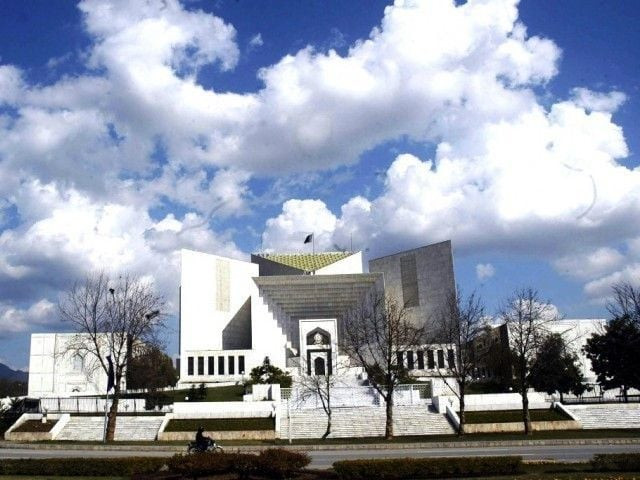SC elevations irk K-P, Sindh lawyers
Four PHC judges meet with CJP to convey their concerns

Strong voices are being raised from the bench and the bar of two small provinces over what is being seen as ‘improper’ representation in the Supreme Court (SC).
Sources revealed to The Express Tribune that a delegation of four Peshawar High Court (PHC) judges met with Chief Justice of Pakistan Umar Ata Bandial to convey their concerns for not nominating a judge of PHC for elevation to the apex court.
Similarly, two strong resolutions have been passed by the Sindh High Court Bar Association (SHCBA) as well as the Khyber Pakhtunkhwa Bar Council (K-PBC) on the same subject. All superior bars condemned the approval of elevation of junior judges to the SC.
The KP Bar Council in its resolution noted that over the past many years, the principle of seniority was persistently violated by JCP while picking judges for the SC.
“Mostly the judges from smaller provinces, particularly the province of Khyber Pakhtunkhwa, have been made the victims of injustice,” they said.
They also demanded of the federal government to immediately promulgate proper legislation for granting equal representation to all federating units in the apex court.
They said that after the passage of the 18th Amendment, there were many cases, which were or would be initiated in the SC between the centre and the federating units or among two or more federating units and unless all federating units had equal number of judges in the apex court full compliance to the constitution was in serious doubt.
The statement said that the federation and constitution could only be adhered to in letter and spirit by safeguarding the interests of all federating units by an independent SC with equal representation from all the federating units.
SHCBA statement
A statement has been issued by SHCBA President Shahab Sarki and Secretary Omer Soomro, wherein it is stated the bar "hoped in earnest that the present Chief Justice of Pakistan would have healed the wounds caused during the tenure of the Gulzar Court".
"However, we find that the Bandial Court has further deepened the divisions within the Judiciary; widened the chasm between the Bench and the Bar and lowered the stature of the Hon’ble Supreme Court in the eyes of the people," it added.
“We are confident that had Rules for selection of Judges to the Supreme Court been devised, Justice Shafi would have been selected and not subjected to the vagaries of an opaque voting process,” it added.
Similarly, the SHCBA stands in solidarity with Chief Justice Ahmed Ali M Sheikh, Justice Irfan Sadaat and Justice Aqeel Abbasi, "all of whom were unjustifiably superseded without ever being considered by the Judicial Commission for appointment to the Supreme Court".
"We also stand in solidarity with the Hon’ble Chief Justice of Khyber Pakhtunkhwa, who, has been unfairly overlooked for appointment to the Supreme Court," it added.
"We take serious notice of the U-turn taken by the Government through its Attorney General and Law Minister in such JCP meeting. Indeed, if a resignation had to be tendered by the Law Minister, on a matter of principle, such resignation ought to have been tendered prior to the JCP vote and not after Government capitulated and took its U-turn," it added.
The SHCBA said that it takes notice of the fact that of the three vacancies that arose in the SC on the retirement of Judges appointed from the Sindh High Court. "Only two Judges from the Province of Sindh have been appointment to the Supreme Court. The third vacancy was arbitrarily filled by (an out of turn) promotion to the Supreme Court given to a Judge of the Lahore High Court," it stated.
"At this critical juncture, the Sindh High Court Bar Association would like to express its solidarity with Mr Justice Shafi Siddiqui, who, once more, was caused undue embarrassment by the opaque selection process of the Judicial Commission of Pakistan and the failure of the Hon’ble CJP to give due consideration to the other Members of the JCP as well as the Members of the Bar and their call to frame rules and in the interim adhere to the Seniority principle. Mr. Justice Shafi of the Sindh High Court, aside from being a competent Judge is a thorough gentleman," it added.
The Islamic Republic of Pakistan is a federal republic, it mentioned. "The Supreme Court is our highest court, whose constitutional role includes adjudication of disputes between the Provinces inter se and between the Province(s) and the Federation," the association said.
"The Supreme Court must reflect the federal character of the republic and be representative of our diverse ethnic groups. Unfortunately, the recent appointments of the Supreme Court seek to rob it of its federal character and will promote divisions along existing fault-lines within the country.
Equally so, it is pitiful that of the three vacancies from the Province of Sindh, not one Sindhi-speaking Judge was considered fit for elevation to the Supreme Court. It seems we have learnt nothing from history and are fated to repeat it," it added.
In case the Parliamentary Committee on Judges Appointment approves the JCP nominations, eight judges will belong to the province of Punjab, three from Sindh, two from K-P and two from Balochistan.
Justice Athar Minallah, who is being elevated from the chief justiceship of Islamabad High Court (IHC), belongs to K-P.



















COMMENTS
Comments are moderated and generally will be posted if they are on-topic and not abusive.
For more information, please see our Comments FAQ